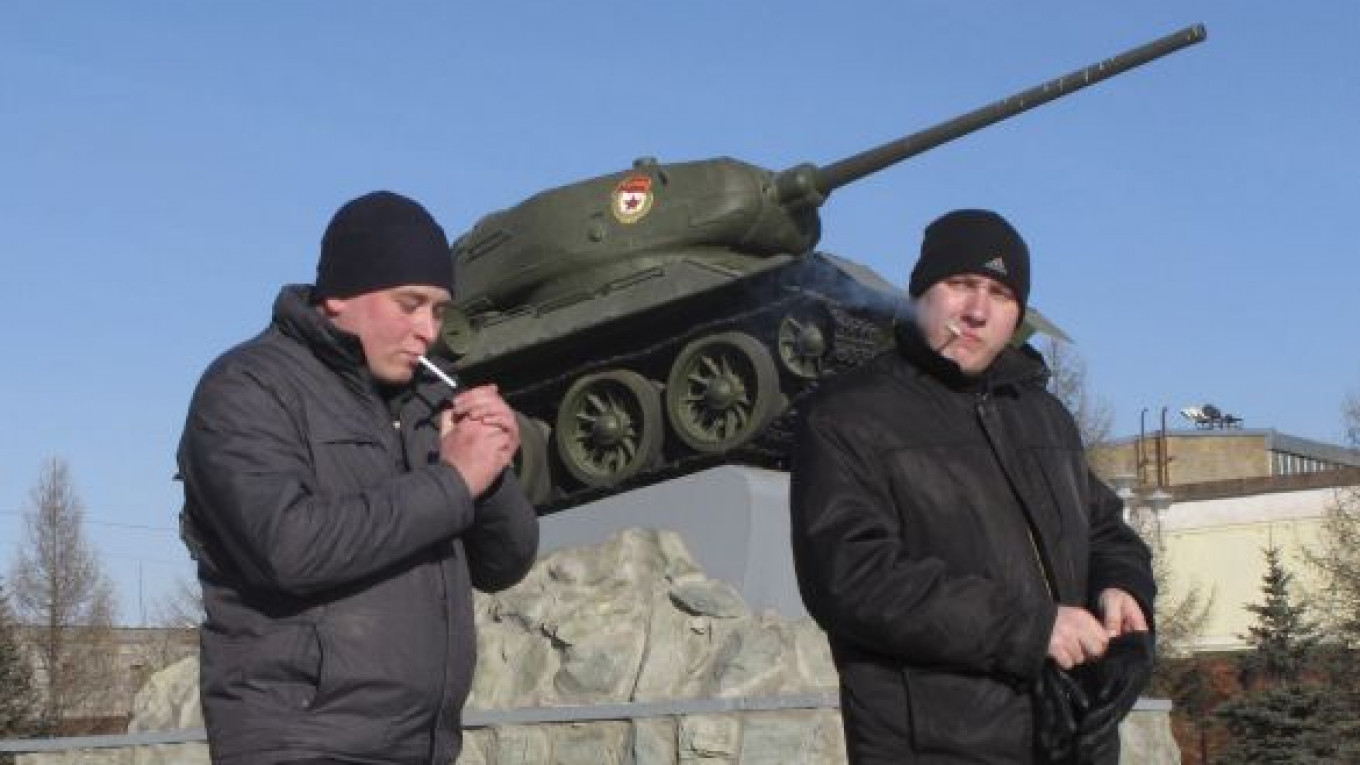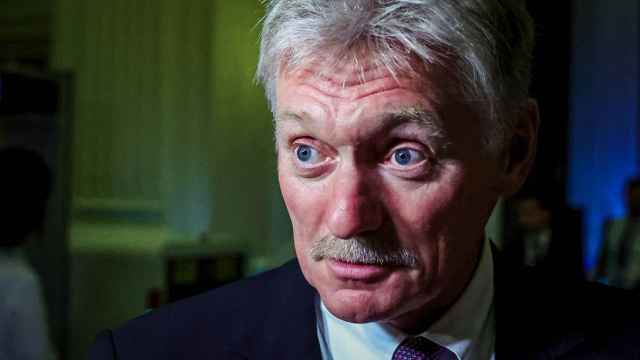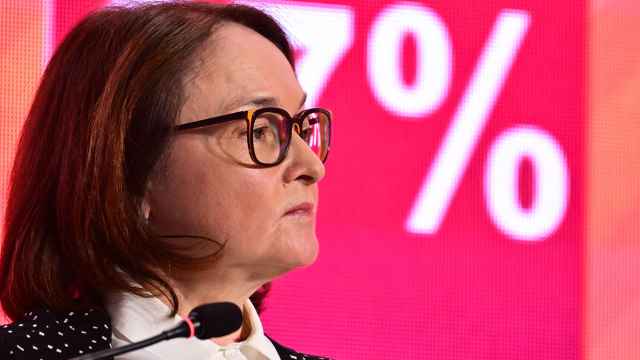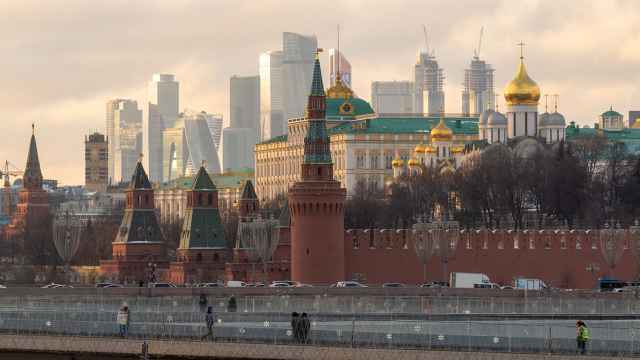NIZHNY TAGIL, Sverdlovsk Region — If Vladimir Putin reclaims the presidency in this weekend's election, he'll owe a word of gratitude to this bleak industrial outpost known for making military tanks.
In December, amid a stunning wave of protests against Putin over fraud-stained elections, the city of smoke-belching factories 1,400 kilometers east of Moscow forced its way into the national consciousness.
The tank plant's workers issued an impassioned manifesto voicing disgust with the demonstrators.
"While we work round the clock in our factories and make products that earn the state money, they roam the streets bawling for their rights," the workers declared.
For the Kremlin, it was a public relations coup that allowed Putin to project the sense that the Russian heartland still loved him.
The reality was a bit different. Less than a third of the city of 370,000 people voted for Putin's party in December, far lower than the national average.
What mattered most for Putin, however, was the imagery contrasting protesters in Moscow and St. Petersburg, dismissed by the Kremlin as rich urbanites, with Putin's traditional blue-collar support base, which he portrays as the "real Russia."
The tank factory allowed Putin to cast himself as the working man's hero. Nizhny Tagil became an emblem of the values Putin is striving to foster: hard work, order and full-throated loyalty to the leadership.
A pro-Putin rally by workers at the Uralvagonzavod plant on Dec. 24, the same day as a massive protest in Moscow, "proved a lifesaver for Kremlin strategists and government officials in the region," political analyst Sergei Moshkin said.
A nationally televised call-in show with Putin included a video link to the Uralvagonzavod plant, where a cadre of workers stood as their spokesman, Igor Kholmanskikh, vowed that he and his colleagues would help clear the streets of protesters if the police failed to do so.
Kholmanskikh, who has become the poster boy for a campaign aimed at drawing the working-class vote, traveled to Moscow in late February for a giant pro-Putin rally, where he denounced "those loafers who are always grumbling."
Yet for all that, few among the steady trickle of employees trailing out of the Uralvagonzavod plant at the end of a recent shift appeared enthusiastic about Sunday's election.
"Voting won't settle anything," said 27-year-old welder Sergei Zubov. "Putin is going to win, whatever happens. That much is clear."
For others, however, the memories of the turbulent 1990s, when salaries often went unpaid for months, are a strong inducement to vote for a leader whose tenure in power has been marked by stability and steadily rising prosperity.
"Most people are worried about the prospect of more crises, and they are sick of revolutions," said 41-year-old Oleg Libin, who has worked at Uralvagonzavod for 15 years.
Nizhny Tagil, despite a sprinkling of shiny new shops and restaurants, is largely a grim landscape of sooty neighborhoods, rutted roads and creaking government buildings.
Disappointment with the state of the city's roads, schools and hospitals led to Putin's United Russia party earning a dismal 32 percent of the vote in December's parliamentary elections in Nizhny Tagil.
Putin needs to win more than half the national vote Sunday if he is to avoid a second round.
The nationalist Liberal Democratic Party and the Communists, both of which have fielded presidential candidates, scored 18 percent and 17 percent of the vote, respectively, in Nizhny Tagil.
But Putin's camp appears to be counting on the Uralvagonzavod workers to carry the day. Their company is a monolithic presence in the city, which should make the employees' involvement in political campaigning crucial.
Uralvagonzavod chief executive Oleg Syienko "very, very much wants not just to help Putin, but to do it demonstratively, to prostrate himself and show his loyalty," Moshkin said.
Indeed, speculation is rife that Uralvagonzavod workers' burst of enthusiasm for Putin was initiated by the management.
Uralvagonzavod billboards promising a vibrant future for Nizhny Tagil are ubiquitous in the city. On some roads, those billboards are interspersed with giant Putin campaign posters. The implication is hard to miss: The only way is Putin's way.
Putin promised in September to pump more than $2 billion into developing the company, once renowned for churning out the nimble T-34 tanks that were instrumental in the Red Army's defeat of invading Nazi forces.
Alexei Zharich, a public relations executive who has made a career of heaping praise on Putin, was appointed Uralvagonzavod vice president in 2010.
Making this prominent Putin booster with no obvious track record of senior management in heavy industry an integral part of the company was a clear gesture of loyalty from the prime minister.
And amid suspicions of cronyism, the Uralvagonzavod business model remains murky.
In recent years, the plant has struggled to find markets for outmoded machines that even Russian defense officials have been sniffy about buying.
The bulk of the company's income now comes from producing railway cars, which are considerably easier to sell.
In 2007, as president, Putin ordered the Uralvagonzavod plant to be transformed from a state concern into an autonomous company. Over the coming two years, 25 percent of its shares are to be put up for privatization.
As the slow transformation process slogs on, Uralvagonzavod has busily broadened its portfolio, scooping up valuable industrial concerns, including a Chelyabinsk tractor plant and a former rival tank manufacturer in Omsk.
Those acquisitions can make it highly valuable when the privatized shares go on the market over the next two years. And the love fest between Uralvagonzavod and Putin has inevitably provoked speculation about financial gain.
A Message from The Moscow Times:
Dear readers,
We are facing unprecedented challenges. Russia's Prosecutor General's Office has designated The Moscow Times as an "undesirable" organization, criminalizing our work and putting our staff at risk of prosecution. This follows our earlier unjust labeling as a "foreign agent."
These actions are direct attempts to silence independent journalism in Russia. The authorities claim our work "discredits the decisions of the Russian leadership." We see things differently: we strive to provide accurate, unbiased reporting on Russia.
We, the journalists of The Moscow Times, refuse to be silenced. But to continue our work, we need your help.
Your support, no matter how small, makes a world of difference. If you can, please support us monthly starting from just $2. It's quick to set up, and every contribution makes a significant impact.
By supporting The Moscow Times, you're defending open, independent journalism in the face of repression. Thank you for standing with us.
Remind me later.






